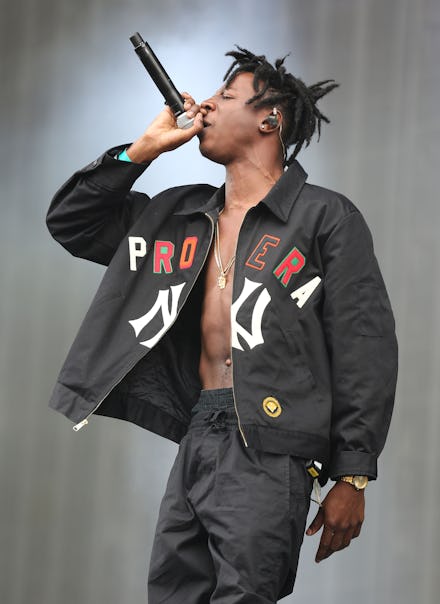Rapper Joey Badass has a searing message about racism and white supremacy in the Trump era

At great risk to his livelihood, rapper Joey Badass has made no qualms about using his platform to call out racial hatred in America. Ahead of the April 7 release of his album, All-Amerikkkan Badass, the Brooklyn native issued a searing critique of President Donald Trump, overt racism and white supremacy he says is on the rise across the nation.
"(Trump) revealed that (racism) is still alive and well — that there's still bigots out there," Joey told CNN in an interview published Tuesday. "He exposed the bigotry that still exists in this country even after a black president. ... People have to realize and wake up and notice that the country is not here to benefit everyone that's living in it."
Joey joins a growing list of artists — musicians and non-musicians, black and non-black — who are taking up the charge to speak out against hatred, xenophobia, misogyny and discrimination. For Joey's part, he's releasing an album that thematically explores race relations through the lens of someone who fits squarely into Generation Z.
All-Amerikkkan Badass — using a spelling of America containing a reference to the Ku Klux Klan — includes the tracks "Land of the Free," a general commentary about the state of politics and race relations, and "Super Predator," an apparent reference to the term Hillary Clinton once used to describe black and brown youths targeted by tough-on-crime policies that caused mass incarceration during Bill Clinton's presidency.
"This is what I think about every day," the 22-year-old rapper told CNN. "This is not me stepping out of my comfort zone or anything. This is literally what I feel and what I've been dealing with since I was born."
Many of the rapper's fans know Joey is not a fan of Trump. In September, he reportedly squared off with Philip Willburn, a professional Trump impersonator who climbed onstage with Joey during a performance for an MTV music series, before the rapper physically pushed him back into the audience. Willburn is suing Joey for $1.5 million over medical expenses and loss of profits because injuries he claimed to have sustained, TMZ reported.
Questions of Trump's racial insensitivities have dogged the 45th president since he launched his campaign by referring to Mexican immigrants as murderers and rapists. Later, then-candidate Trump described rough, crime-ridden inner cities as the province of African-Americans and called for a ban on Muslim immigration to the United States, which he has twice attempted to do as president.
Such behavior has also given rise to racial animus from others, including Rep. Steve King (R-Iowa) — who espoused white supremacist rhetoric on national airwaves — or former KKK grand wizard David Duke and alt-right activist Richard Spencer, who have similarly encouraged racially divisive attitudes.
"People are starting to wake up and confront the issues that are going on," Joey said. "Especially black people, because I honestly believe President [Barack] Obama put black people to sleep, in a way."
The rapper, whose given name is Jo-Vaughn Scott comments reflect a surge of political messaging in hip-hop music. Before Scott, genre icons A Tribe Called Quest released the well-timed album We Got It From Here... Thank You 4 Your Service, which includes commentary on the rise of Trump.
On Wednesday, rap icon Snoop Dogg drew Trump's criticism via Twitter over a music video for the song "Lavender." The video depicts the rapper firing a fake gun at a clown Trump lookalike and mocks first lady Melania Trump. As art, it's in line with growing concern that U.S. race relations are set to worsen under a Trump presidency.
Hip-hop music is reflecting a broader frustration with race relations in Trump's America. A Gallup poll released Wednesday found that 42% of Americans worry a "great deal" about U.S. race relations. The findings represented a record high since Gallup began surveying attitudes about race relations 17 years ago. When the Black Lives Matter movement grew to national prominence in 2014, just 17% of Americans said they worried a great deal about race relations.
In the days following the 2016 presidential election, a Pew Research Center survey showed that 74% of black Americans said they expected race relations to worsen under Trump, while 5% said they expected relations to improve. Another 17% expected there to be little change. Joey said these sentiments are why artists will increasingly use their platforms to speak out.
"The music has taken a shift now," Joey told CNN. "I'm not the only artist [who] feels this way. Everyone is starting to feel somewhat responsible because we're realizing the power that we have as individuals, as musicians, as people with high influence."
Watch Joey's "Land of the Free" video below:
March 21, 2017, 7:34 p.m. Eastern: This story has been updated.